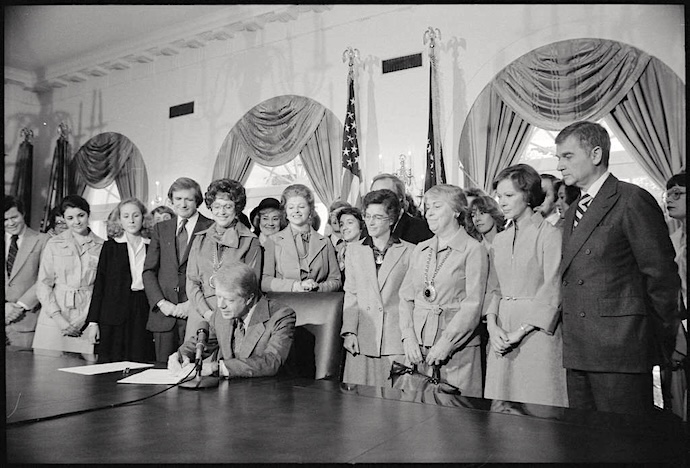Although it has since been removed from the White House website, on Friday afternoon, with seconds remaining on his presidential clock, Joseph Robinette Biden announced (noticed?) that the Equal Rights Amendment met the requirements to be added to the constitution… five years ago. A year before he assumed the presidency.
 Biden’s statement notes that 38 states, most recently Virginia in January 2020, have ratified the ERA and that the American Bar Association confirms the proposed legislation has cleared all criteria to become the 28th Amendment to the US Constitution. That the ERA is actually already part of the Constitution—merely awaiting the signature of the first-ever woman Archivist of the United States to announce that fact to the American people. “The Equal Rights Amendment has become part of our Constitution,” Biden writes.
Biden’s statement notes that 38 states, most recently Virginia in January 2020, have ratified the ERA and that the American Bar Association confirms the proposed legislation has cleared all criteria to become the 28th Amendment to the US Constitution. That the ERA is actually already part of the Constitution—merely awaiting the signature of the first-ever woman Archivist of the United States to announce that fact to the American people. “The Equal Rights Amendment has become part of our Constitution,” Biden writes.
On behalf of all American women, may I just say: Oh. I… Oh. Okay, I guess?
As with so many actions Biden has taken in the past several weeks—negotiating the ceasefire that would end Israel’s multi-year genocidal campaign against Palestinians, expanding student loan forgiveness, you name it—this moment is long overdue and possibly (probably?) not going to amount to much anytime soon if at all. But the amendment’s potential to protect vulnerable Americans under an administration hostile to their very existence inspires hope, even as we brace for the future.
A new (Constitutional) hope
The amendment as written is straightforward and only controversial if you think that women aren’t, you know, people. (To be fair, the Constitution has always been a little murky on the personhood of women.) Here’s what it says:
Section 1. Equality of rights under the law shall not be denied or abridged by the United States or by any State on account of sex.
Section 2. The Congress shall have the power to enforce, by appropriate legislation, the provisions of this article.
Section 3. This amendment shall take effect two years after the date of ratification.
That’s it. Just: it shouldn’t be lawful to discriminate against someone on the basis of sex. It sounds so simple, right? Advocates brought the first version of the ERA before Congress in 1923; Virginia’s ratification means the ERA reached the three-quarters states’ majority necessary for amending the constitution in 2020. Nearly 80% of Americans support gender equality, even if many remain allergic to the word “feminist.” Biden said the ERA is now, perhaps has been for nearly three years, the law.
So what’s the holdup???
The ERA hit a few snags on its way to ratification—arguments that the 14th amendment’s equal protection clause makes the ERA redundant; Phyllis Schlafly; the Church of Jesus Christ of Latter-day Saints (although attorney, activist, author of Ordinary Equality, and former LDS member Kate Kelly has dedicated her career to rectifying that harm); and, perhaps most pertinent to Biden’s announcement, a preamble that required ratification of the amendment by 1979. Congress extended the deadline to 1982, but the ERA still fell three states short of the necessary 38.
Until 2017, when Nevada ratified the amendment, followed by Illinois in 2018 and Virginia in 2020. Advocates insist that while the deadline set in the ERA’s preamble has inarguably passed, Article V of the US Constitution offers no guidance on time limits for proposed amendments’ ratifications. In fact, there were a full two centuries between the proposal of the 27th Amendment (1789) and its ratification (1992), following a successful campaign led by a college student to promote its passage. In this case, as it might be with the 28th Amendment, the states’ ratifications made the amendment law; the Archivist’s signature merely certifies the amendment.
This issue has been causing a lot of confusion online as many of us scramble to find out what the heck an Archivist’s job actually is. The role, Kelly explained, is procedural and has no legal import. When I asked if the Archivist’s signature was effectively a constitutional amendment’s birth announcement, Kelly said it was a good analogy. The person (or amendment, in this case) exists whether the birth is announced or not. In the case of the 28th Amendment, Kelly insisted, “it’s not even a baby! The amendment is five years old!”
Kelly agrees that the Archivist should publish the amendment in the Federal Register, but her failure to do so does not negate the constitutionality of the Equal Rights Amendment. The next step, Kelly said, is implementation. “We’re going to file substantive lawsuits based on the 28th Amendment. We’re going to pass laws because we have new constitutional hopes. We’re going to fully embrace the fact that we have changed the Constitution.”
Regardless of their sex
On its face, Biden’s confirmation of the ERA’s constitutionality is a win for women and, one would think, democracy. I spoke to attorney, professor, columnist, and author of The Originalism Trap: How Extremists Stole the Constitution and How We the People Can Take It Back Madiba K. Dennie to try and get some clarity on this mess.
Dennie agreed many experts concur with Biden that the 28th Amendment is already part of the US Constitution. “Legally questionable constitutional amendments have honestly been the norm throughout American history,” she noted. Both Kelly and Dennie emphasized that enforcement of the 28th Amendment was not an issue of the amendment’s constitutionality, but rather of the political will to implement it.
Given the incoming administration’s willingness to throw trans people under the bus at every possible opportunity, I expressed concerns that the 28th Amendment might be weaponized to legally codify convenient biological fictions like “genetic sex” and further disenfranchise trans Americans. Dennie explained that “in theory, the ERA should be great for trans people” and that arguments can and should be made that “anti-trans discrimination is sex-based discrimination.”
VoteEqualityUS and other advocacy groups have certainly made this argument. But, Dennie continued, “if [the 28th Amendment] were actually recognized as law, the right wing will try to weaponize it,” suggesting that regressive lawsuits might argue that banning trans people from public bathroom use, keeping trans kids off sports teams, or denying trans people gender-affirming healthcare constitute gender-based protections rather than sex-based discrimination.
Kelly concurred, noting that laws meant to protect vulnerable populations are frequently turned against their intended use. “That always happens,” Kelly said. But to do that, anti-trans activists and other regressive political actors “would first have to acknowledge the ERA as legitimate.” Kelly argues that “the modern opposition to the ERA has homed in on anti-trans arguments as a way to drive a wedge between cis and trans women and sow discord,” and that the ERA should not be understood as antithetical to trans rights.
When I asked if the ERA’s implementation might not come at the expense of trans rights in much the same way that the 19th Amendment came at the expense of Black women’s suffrage, Kelly clarified that advocates for the 19th Amendment deliberately chose not to actualize universal voting rights. But because the ERA makes no mention of any specific gender, the 28th Amendment as written lends itself to the protection of trans people. Combatting discrimination on the basis of sex, Kelly insists, “can and must include trans people.”
May it be so.





